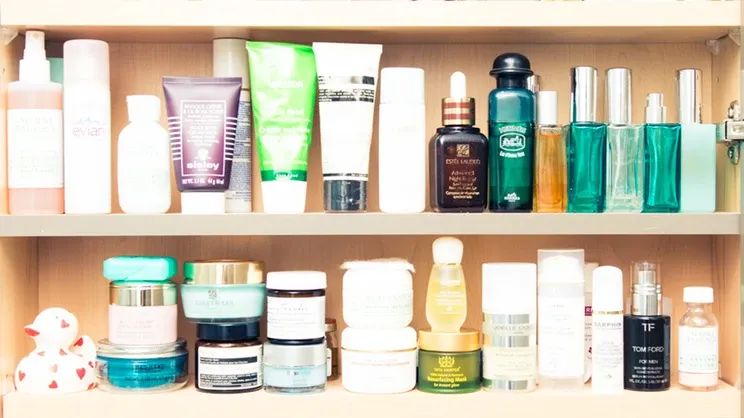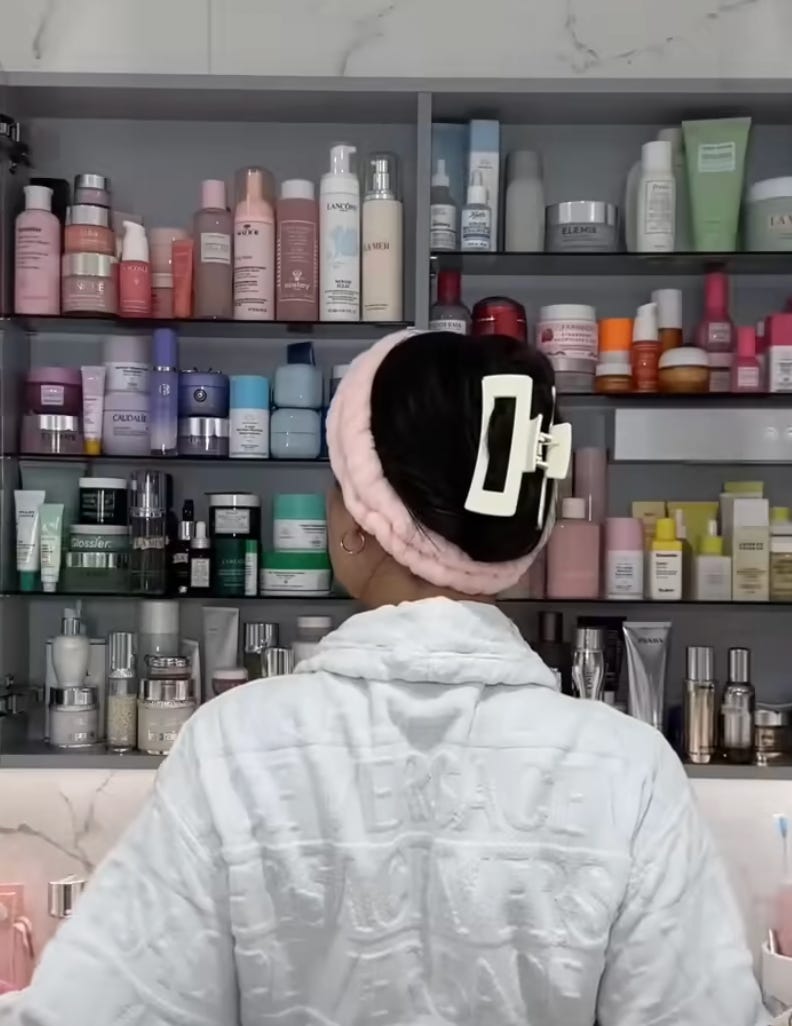The Not-So-Subtle Aggression of Self-Care
How the internet trend of "self-care" is problematic, why the way we talk about wellness-related buzzwords matters, and more!

With the trends of shopping hauls, skincare, and “that girl” morning routines, the era of “self-care” is in full swing. Open up Instagram Reels, Tiktok or Youtube Shorts, and you’re eventually bound to see bite-sized videos of elaborate morning routines, “restocking” and “runnings errands” (…to Starbucks and Target) from a variety of creators with suspiciously similar content. In spite of the video categories that are *technically* different, what do these videos have in common? Click the images below to watch some Youtube Shorts to see what I mean:



Vc: olaffleeevlogs, mackenziewc, caitlinthexton
These types of “self-care” videos have a modern, sleek, hyper-trendy flair, featuring a bevy of expensive products (La Prairie?!), perfect skin, model-like bodies, and drool-worthy interior decor. However, the trend and the conversation of “self-care” has been around long before the age of the internet. Studies published as early as 1995 have been diving into the effects of consumerism on self-esteem and body-image. Since the dawn of the influencer, however, the consequences of the toxic types of “self-care” and consumerism have only been magnified.
Social media’s tightening grip on our society makes for numerous opportunities for content creators and brands alike. As new products come out, companies mail out PR packages to many types of content creators, who then review the products either free of charge or with a monetary incentive from the company. The persuasive power that these influencers wield over their audiences is astounding, and well-studied. Creators’ audiences are then mobilized—credit cards out and ready—to pounce at online discount codes, exclusive launches and more, to incorporate the favorites of their most-loved creators into their own lives. With the countless business opportunities and “influence” (literally) that companies and corporations have (via both creators and content) comes the increasing pressure to perform, and to perform perfectly. In the realm of self-care, that means crafting the perfect morning routine, showcasing the most expensive, flashy shopping or Sephora hauls, and extensive skincare routines that put spas to shame.
This is not to say that there is anything bad per se about extensive skincare, and shopping. In fact, the little treats that you incorporate into your life that bring some added joy can be a great thing—not to mention that this type of content is oddly fun to watch! However, what is especially concerning about the “self-care” trend to me is the self-comparison to both content creators and peers, overconsumption, self-obsession, and the neglect of actual self-care.
On the “Self-Care” trend’s influence on self-esteem and consumerism:
It is easy to blame the content creators themselves, or the parents of the nightmarish-sounding “Sephora teenagers” (an article for another time…), but I believe that the onus lies directly on corporations for purposefully pushing unbridled consumerism as the norm onto impressionable teens, young adults, and social media users in general. The problematic “self-care” videos leads teenagers (as well as many adults, and even children?!) to be hyper-focused on products as status symbols, and pushes the necessity of wealth to be cool and on trend. Though I could definitely expand on the negative impacts that content has on self-esteem, I feel like that would warrant a whole other article to adequately address it.
Studies note that in American society, social media “intensity” can spawn obsessive materialism (via overspending), especially given how quickly trending products cycle in and out of “coolness.” What is a prime example of this, you may ask? To that, I answer: the water bottle obsession.
Most people are perfectly capable of drinking from a fountain. Heck, lack of water sources aside, there really isn’t a practical reason in most settings to lug around a giant water bottle with you everywhere that you go; however, people do it anyway. There is even a detailed article that gives a detailed overview of the history of which water bottles were “in” over the years. Though hydration is (I think) an important part of basic self-care, the water bottle has evolved from something of a pure necessity to a status symbol. As of today, the water bottle craze is so great that people are willing to get into physical fights, just to get a Stanley Cup—the latest trending water bottle. Perhaps the most ironic facet of the Stanley Cup’s rise to fame is that it was originally designed for construction workers, before an influencer sponsored the cup. Despite the hefty price tag of around $50 for a water bottle—and recent findings of LEAD IN THE STANLEY CUPS—the demand remains sky-high. Nevertheless, I predict that it is all but inevitable that the hundreds of dollars that many spend on Stanley Cups alone will go to waste as the trend-hoppers fight over the next popular water bottle that will replace the Stanley—but consumerism and the search for status will remain.
Why does it matter how we talk about “health” and “self-care?”
Much of what we learn in the world comes directly from other people: by word-of-mouth, social media postings, and the like; essentially, we often learn connotation before denotation. Though the denotation of the words “health” (definition: being “sound in body, mind and spirit”) and “self-care” (literally “caring for oneself”) are completely unproblematic, the connotation of these words has been shaped by consumerism, corporate agendas, and vanity. The soft power that content creators—and thus, corporations—wield over impressionable people is immense; “health” and “self-care” connote whatever will deliver more sales (*ahem, revenue*) to the companies producing these products. As long as the colloquial definition is geared towards consumerism and vanity, rather than truly nurturing yourself, the issues that I have outlined above will continue to persist.
The optimist in me is tempted to write that it is solely in our hands to re-write the definition of what it means to be healthy and to take care of yourself. Realistically, this will be impossible on a larger scale in the absence of systemic change in the way that corporations market to consumers (notice how I didn’t use “customers” here). I doubt that the necessary change will ever come. That being said, what we can do is to lead by example, in the hopes that we will impact those closest to us—our family, our friends and our children—whom in turn may impact others. However, there is one last question that needs answering…
The neglect of “legit” self-care: what IS self-care (and what it isn’t)?
Because the connotations of “self-care” and even “health” are so warped and can vary widely depending on whom you ask, there really isn’t a generally legitimate form of self-care. However, in my humble opinion, what sets apart healthy self-care from consumerist, vanity-oriented self-care is the intent that you put behind it, moderation, and how you prioritize what to do for self-care. Healthy forms of self-care help to maximize your functioning in daily life in a sustainable way. For example, rather than eating a whole tub of ice cream and venting for hours to your partner after a fight with your friend (which is delicious, but would make you sick), a healthier alternative would be to have a nourishing, delicious dinner to keep you satisfied and a regular serving of ice cream, vent for a few minutes to get your feelings off of your chest (if your partner has the capacity to listen), and later, practice healthy coping skills (such as walking, listening to music, or reading).
Pro-tip: anyone working in mental health may use jargon like “coping skills” and “treatment plans,” and what those boil down to is doing things that (quite literally) help you to get through what you’re going through in a healthy, sustainable way (at the very least, a good coping skill will distract you and prevent you from getting worse, especially when things take time to improve—which they often do).
The gist of it is that every action that you take to care for yourself has an intention behind it: whether it’s to eat a good meal and some ice cream to satisfy you and prevent you from binging later on (which would make you feel WORSE down the line), or to prevent rumination when you’re venting (we all do it sometimes, but being stuck on the same topic will—again—end up making you feel more terribly). Additionally, notice in the example that nothing was taken to an extreme; I find that moderation is generally more sustainable in most things—this is more of my subjective opinion, though (and obviously, there are exceptions).
Self-care is not only done with intention and moderation, but in my mind, good self-care requires longevity and sustainability. Take exercise, for example. It’s common knowledge that moving each day improves your health in a variety of ways (again, this warrants a whole other article). However, the trope of making massive, unrealistic New Years’ Resolutions (which are B.S., in my opinion) makes a negative example of this. Instead of committing to going to the gym for two hours per day (a la Dr. Andrew Huberman) and stopping exercise completely after a month (because not many people have, or frankly, want to make the time to do so—myself included), a more sustainable and—might I argue, more effective—way to exercise (and thus, practice self-care) would be to actually commit to taking a walk at a solid pace for a half-hour each day, and following through with it for a year or more.
Note: with exercise in particular, studies have concluded that consistency is vital to maintaining important facets of health—like insulin sensitivity levels—with moderate and high-intensity exercise having virtually the same effect in obese adults (this study goes in-depth, though it’s a smaller sample size).
Lastly, what is perhaps the most overlooked portion of self-care in my view is strengthening the support system that you have around you. Now, more than ever, people are becoming more and more isolated from each other—click here for a study on why. We all need connection, a real community (I hate, hate, hate how academia and some past workplace people yap about community, yet do nothing to rally around others when they need it), and to simply be with others with no agenda. The topic of community will be something that I would love to touch on in another article, but for now, know that I feel that having people who love and support you is vital to health and self-care.
If you take nothing else from me today, know that self-care is much more simple (and less expensive) than you think it is, and that as long as you treat others kindly and respectfully (and try your best to treat yourself that way, too), you’re probably doing much better than you think that you are. There will always be more to improve upon in your life—and there is no light at the end of the tunnel where everything (or you as a person) will be absolutely perfect—ever. That’s the point. This is not to say that life sucks, quite the opposite; but with true self-care, reflection and community, you can begin to make your life at least a little bit better right now.
Note: look for the hyperlinks in the text to explore the content and studies that I’ve been looking at for this article! The title was inspired by one out of the LA Times, linked here.
